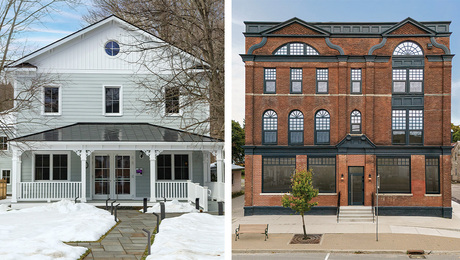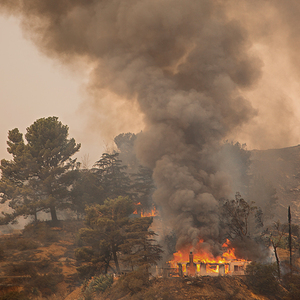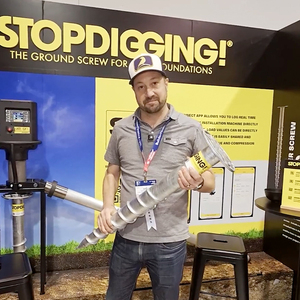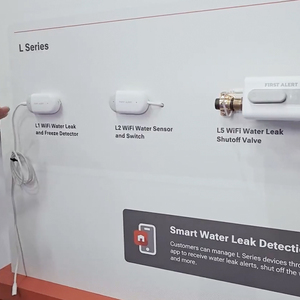If a general contractor owes you money on a job and if he does not pay, is then the owner of the premises also responsible? That is, if the GC does not pay you can you sue the owner for your payment?
Discussion Forum
Discussion Forum
Up Next
Video Shorts
Featured Story

A high-performance single-family home builder shares tips from his early experience with two apartment buildings.
Featured Video
How to Install Cable Rail Around Wood-Post CornersHighlights
"I have learned so much thanks to the searchable articles on the FHB website. I can confidently say that I expect to be a life-long subscriber." - M.K.
Fine Homebuilding Magazine
- Home Group
- Antique Trader
- Arts & Crafts Homes
- Bank Note Reporter
- Cabin Life
- Cuisine at Home
- Fine Gardening
- Fine Woodworking
- Green Building Advisor
- Garden Gate
- Horticulture
- Keep Craft Alive
- Log Home Living
- Military Trader/Vehicles
- Numismatic News
- Numismaster
- Old Cars Weekly
- Old House Journal
- Period Homes
- Popular Woodworking
- Script
- ShopNotes
- Sports Collectors Digest
- Threads
- Timber Home Living
- Traditional Building
- Woodsmith
- World Coin News
- Writer's Digest


















Replies
It is possible.
A lot depends on the exact wording of any contracts that you have with the GC and also the state laws.
The basic idea is that the homeowner is repsonsible for paying for any work that his done on his property.
More than once a sub or supplier has gone after the HO when the GC does not pay.
But again state laws will vary drastically about how and when they can do that.
I'm not a contractor, but have read a number of pieces on this. It varies by state, but yes, the property owner is responsible. You are entitled to place a lien on the property so if you can't get paid soon, at least you'll get paid when the property sells. But, generally you have only a short time, such as 60 days, to place the lien. You should get advice from a lawyer. You'll know the answer for certain, and, probably this won't be the only time this will happen if you stay in business a long time.
I agree that you can place a lien within a VERY limited time frame. Be aware, however, that many states require you to provide a "notice of furnishing" to the owner... so it is not just as easy as going and filing a lien. A "notice of furnishing" is a document that puts the owner on notice that you are performing work on his property, and you have not waived your lien rights.
Contact a lawyer who specializes in construction. If you don't follow state procedure, your lien will be void. If your lien is void... you could end up with difficulty in a suit against the owner.
Another factor to consider is your state law regarding payment of subs after the GC is paid for the work by the owner (ie, the owner has paid the GC for the plumbing rough... but the GC does not pay the plumber within state proscribed time frame). If types of performance bonds have been issued on the job or GC, there may be a claim there also. Again.. contact a lawyer.
Edited 8/1/2004 6:35 pm ET by Rich from Columbus
Rich has it right. It varies from state to state, and usually depends on whether or not you filed a 'preliminary notice' with the owner. That notice tells the owner that you have lien rights and can in fact pursue him for your money EVEN IF he paid the GC per his contract with the GC. I do not believe your contract with the GC has anything to do with it. Here in WA I am required to give owners a very specific one-page notice that explains the entire thing to them. State law even specifies a minimum type size for this notice.
You need to get the consumer protection agency in your state on the line and find out what the specifics are, in particular when the notice has to be filed and how. Sometimes you have a bit of time after the job to file it. I think in your position I would contact the owner and let him know you have not been paid... he may want to stop paying the GC. Also, do not sign any type of lien release notice until you have been paid in full and the checks have cleared.
The info you have posted makes a perfect example of how it can vary from state to state.
As I understand it for here, our lien rights and our opportunity to sue in court are completely separate itmes. It can be necessary to decide which of the two options to pursue. Or - if we want to take the lien, and the time has expired, we can go the suit route instead.
Normally , here, both GC and HO would be named in a lawsuit. Laws lean to protecting the working man here, if he minds his Ps and Qs
Welcome to the Taunton University of Knowledge FHB Campus at Breaktime. where ... Excellence is its own reward!
Not in Arkansas . You can only come after who your contract is with, however ; If you play by the rules and only work for liscened contractors they are insured and "bonded".< There lies your money.
Tim Mooney
Dave has a good point. You should definitely tell the owner you haven't been paid. That alone may be enough to get things settled up. If the owner hasn't paid the GC everything, you can work out an arrangement where he pays you directly and deducts it from what he owes the GC. But, the clock ticks fast on leins, though, so you should call a lawyer ASAP. The lawyer may just call the GC and owner and that might be enough, too. And of course, a lawyer would have much experience with not only what the law says, but what is the most successful and quickest method of collection. At a minimum you have to know when your lein rights expire.
For those who think the HO is responsible, what can the HO do to protect themselves? They surely don't wanna pay twice, and of course will not have budgeted for that.
One simple phrase.
LIEN RELEASES.
But isn't the lien release after the contractor's been paid? If I'm the HO, I wanna avoid this in the first place. i.e. I wanna know that when I make my contracted payments, that I can't later be bitten for non-payment.
Came across this while snooping around... http://www.lienlawonline.com/lienlaw.asp
Edited 8/2/2004 1:31 pm ET by Cloud Hidden
Part of the same contract should require the contractor to provide you with lien releases. No releasee no checkee.
And when he can because he can pay the sub and the sub does not trust him then you can make payment endorsed to both.
One thing to do is to watch who does work on the job and who supplies material.
To judge from everyone else in my life, I must be particularly dense these last few days.
HO makes a scheduled payment to GC. Can't get a lien release till all work done, right? But an LR from the GC doesn't apply to the subs, does it? So the HO has no certainty that the subs will be properly paid, and since the HO never had a contract with the subs, doesn't even know what they are to be paid, and therefore, what the exposure is.
Taken to extreme, GC could bid the house at 250k and be collecting on that, while subs' bids could add up to 400k. GC could skip town and subs could hit up HO for 400k. How would lien releases help the HO here? How would HO even know to protect him/herself with a bond for the 400 instead of the 250?
Now being an attorney and not knowing the laws in all 50 states I am just winging it here.
But I doubt that at "this point" (where you are making payments) that you can protect yourself 100% against an out right crook. I think that lien releases are mored designed to protect you from poor businesman or one that get over extended.
But there is one thing that can protect against the drastic overbilling that you suggested. And that is deeding the property to the builder. Then the liens are all on him. You are limited to the amount paid to the builder before the project blows up. And my guess is that a properly drawn up contract will make you first lien hold (since this is written before any work starts) and put you ahead of any other liens.
"Can't get a lien release till all work done, right?"
You should be able to a lien release on all work up to that time. For example is you are making a payment after dry in you should get a lien release from the excavator, foundation person, concrete supplier, plumber for under slab work, lumber package, and framing sub.
Cloud,
We sign Conditional lien releases all the time. Contractor can send those out and it protects the sub and the HO. Basically says that sub is paid up to that point. Works great for progress billings.
Cloud,
Payment schedules are usually tied to construction schedules, so, at the end of phase 1(?) you owe the GC $30k, for excavation, footings, basement floor and walls, and first floor framing and sheathing, not to mention mechanical roughs and stubs.
The GC has paid (shoulda) the concrete guys, the framers, and the plumber and electrician. He also collected Lien Releases from these guys stating the work paid for and the address performed at. Maybe it states all work performed before such and such a date. He also got LRs from any suppliers that he or the subs bought material delivered to your home from. If the material was will call or delivered to the shop, you probably don't need/get an LR for it
When you pay the GC, you get all those LRs that he has collected (and an LR from the GC himself stating paid for all work to date, if it is a T&M job.) The LRs may not have a dollar figure on them, but should note all work by area or date that is being paid for.
Keep a chart or schedule of LRs relating them to area and/or date so's you know that everything is kosher.
Note that the LRs don't cover all work to date of payment, for instance, stuff after phase 1, like framing the main walls or maybe even the roof if the framers are fast and the GC is slow getting his check.
There won't be a perfect correlation between LRs and work perfomed because of discrepancies in timing between payment schedule, work in progress and work completed, but it should be close and never more than one payment different.
The rule is, the LR and the check cross the table at the same time.
SamT
Thanks for the education, all. Never had experience with them. Nothing comparable in my prior professions, and on my house I was the GC and didn't come into contact with them, and now my design work is done before they come up, so it's just been something beyond my radar.
One of the hassles with lien releases is that they usually give the owner the numbers when the GC may not want the owner to have them. I have never seen one that did not list the amount paid, and if it's a conditional lien release for partial payment, then it also lists the total amount expected due under the subcontract when all is said and done. If you're working on a lump sum basis and not sharing all the sub costs with the owner then it gives them a look at the finances that you may not want them to have.
It also usually means that you have to have the cash flow to pay subs and get releases before the owner pays you. It's impractical to have the owner there with his check for the GC, and the GC there with his check for the sub, and the sub there to sign the release. Much easier to have the GC pay everyone and then get paid, but of course we all know at least one contractor who is paying for the last job with the money from this one.
In my experience, very few owners ask for releases.
Now THAT'S an answer that seems to reflect practicalities.
"Much easier to have the GC pay everyone and then get paid, but of course we all know at least one contractor who is paying for the last job with the money from this one."
A few years ago I got into a discussion with some one in another forum.
The guy was talking about have a bathroom redone and he was going to use Home Depot because he did not trust contractors and CA lien laws. He kept saying the next thing that would happen was he would not be there went the 14 yo kid cut his grass and he would put a lien on the house.
Seems that he had a couple of problems. The last was he had a new roof put on. The contractor was a couple of job behind in paying the roofing supplier.
I don't remember if the paid the supplier directly or if it was joint check to the contractor and the supplier, but in any case the supplier had been paid for this job.
But supplier went ahead and out a lien on his house until the contractor had done a couple of more job and was caught up to this one.
I told him that he needed to report that to the state because what the supplier did was completely illegal and he could be in deep do-do.
Thanks fellas for your input! I'll let my lawyer handle this as I'm owed 40 grand on a job, the GC is stiffing me..it's a church..well maybe me and the boys should show up for Sunday services and pass the hat around with some mind boggling verbage. I filed a construction lien on time but I did hear a few times that if the GC does not pay in my state the owner is then responsible.
I'm sure we'd all appreciate getting updates as this progresses. There's regular discussion of liens and related stuff here, but few people post from experience. Let us know how it works out.
Lien releases and/or a specific performance bond that protects the HO in case of a non-payment of a sub.
Most times the owner never knows about it. I bet the mention of a small talk with the owner prompts the GC to Pay. And if it doesn't, a talk with the owner surely will.
" Mr. Homeowner, Just wanted to let you know I have not been paid. While It isn't your problem yet, it may be when no one else gets paid and your job stops"
Of course it's safe to say you'll never again work for that GC
Hell I was deployed and had guys who owed me money fior the whole time. They paid when they heard I would be home soon and considered their not paying as having stolen from my family.